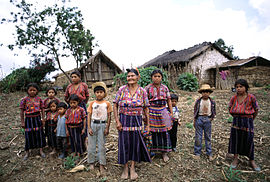Goân-chū-bîn
(對 Gôan-chū-bîn 轉來)

- "
源自 社群 ,人民 抑 民族 是指 歷史 延續 對 入侵 佮 殖民 進前 ,發展 自 怹 領域 的社會 ,怹相信 家己 佮其他 現時 支配 遐 奶肉 (或者 部分 ) 的社會無仝 ."[1]
註解 [修改]
- ↑ 英語
源文 : Indigenous communities, peoples and nations are those which, having a historical continuity with pre-invasion and pre-colonial societies that developed on their territories, consider themselves distinct from other sectors of the societies now prevailing in those territories, or parts of them.
| Pún 文章 sī chi̍t phiⁿ phí-á-kiáⁿ. Lí thang tàu khok-chhiong lâi pang-chō͘ Wikipedia. |